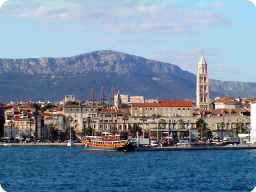

Split
Without hiding their pride, the people of Split will tell you that their city is "the most beautiful in the world". There is no need to discuss this with them, for high-spirited Split will convince you of this, as you will soon discover. This eternally young city with a population of about 200,000, who give it its warm Mediterranean temper, has lived its urban rhythm for as long as 1,700 years, with its heart in Diocletian's Palace and its soul with arms outspread to embrace you. Ever since this time, the city, protected by UNESCO and entered into the register of World Cultural Heritage, has been writing the history of the Croatian south's unique capital.
The city of Split is situated in the warmest region of the northern Mediterranean. It is half-way down the eastern Adriatic coast and is in the immediate vicinity of the rivers Jadro and Žrnovnica, which have been watering it for 1,700 years. Its mild climate, with 2,700 sunny hours per year, makes it an oasis where, sheltered from the wind, one can enjoy the sun even in wintertime. The industrial, university, and business centre of the region nourishes its "green soul" on the hill of Marjan, which is situated in the westernmost part of the peninsula. Marjan's forested park, bordered by the city and the sea, offers pleasant walks under the pines by the sea, far from the noise of the city.
The first inhabitant of Split was the Roman emperor Diocletian who started to build his palace in this friendly bay around 293 AD. After his abdication, he withdrew to this luxurious palace of about 30 thousand square meters. The following turbulent centuries turned the palace into a town which was first populated by the citizens of nearby Salona, fleeing before the Avars and Slavs. The city spilled over the walls of the palace and its rulers kept changing - from Croatian kings in the 10th century AD, through the Hungarian and Venetian administrations, to French rulers and the Austro-Hungarian monarchy. Such a past has left its marks on the city's everyday life. The city, however, has remained the centre of this part of the coast right up to the present. This mixture of historic layers has brought some clumsiness and some things were done too fast, but today all this just represents part of its originality. The silent pulse of history today beats through this big city, with its lively young spirit, specific Mediterranean charm and Croatian warmth.
| GENERAL SERVICES |
- Sea rescue service, tel: 9155
- Emergency: 112
- Police: 92
- Ambulance: 94
- Fire brigade: 93
- Tourist information centre, Peristil, Crkvica sv. Roka, tel: + 385 (0)21 345 606
- International information: 901, 902
- Croatian Automobile Association, roadside assistance: 987
- Firule Hospital, Spinčićeva 1, tel: +385 (0)21 556 111
- Pharmacy Dobri, Gundulićeva 52, tel: + 385 (0)21 348 074
| SHOPS |
- KONZUM, Kraj sv. Marije 2, tel: + 385 (0)21 315 341,
working hours: Mon-Sat 07:00-20:30, Sun 07:00-14:00 - BILLA, Spinčićeva 2j,
working hours: Mon-Sat 07:00-21:00 - LIDL, Poljička cesta 37,
working hours: Mon-Sat 08:00-21:00
| SAILING |
-
Split Port Authority, Gat sv. Duje 1, tel: +385 (0)21 390 222
-
Split Harbourmaster's Office, Obala Lazareta 1, tel: +385 (0)21 355 488
| RESTAURANTS |
- Restoran TERRA, Prilaz braće Kaliterna 6, tel: +385 (0)21 314 801, www.vinoteka.hr
- Konoba MASLINA, Teutina 1a, tel: +385 (0)21 314 988, opening hours: 11:00-24:00
- Pizzeria GALIJA, Kamila Tončića 12, tel: +385 (0)21 347 932
Source: http://www.visitsplit.com/
Video
Current news
 Macrocruise charter agency
Additional discount on the boat rental price of betw
Macrocruise charter agency
Additional discount on the boat rental price of betw


























